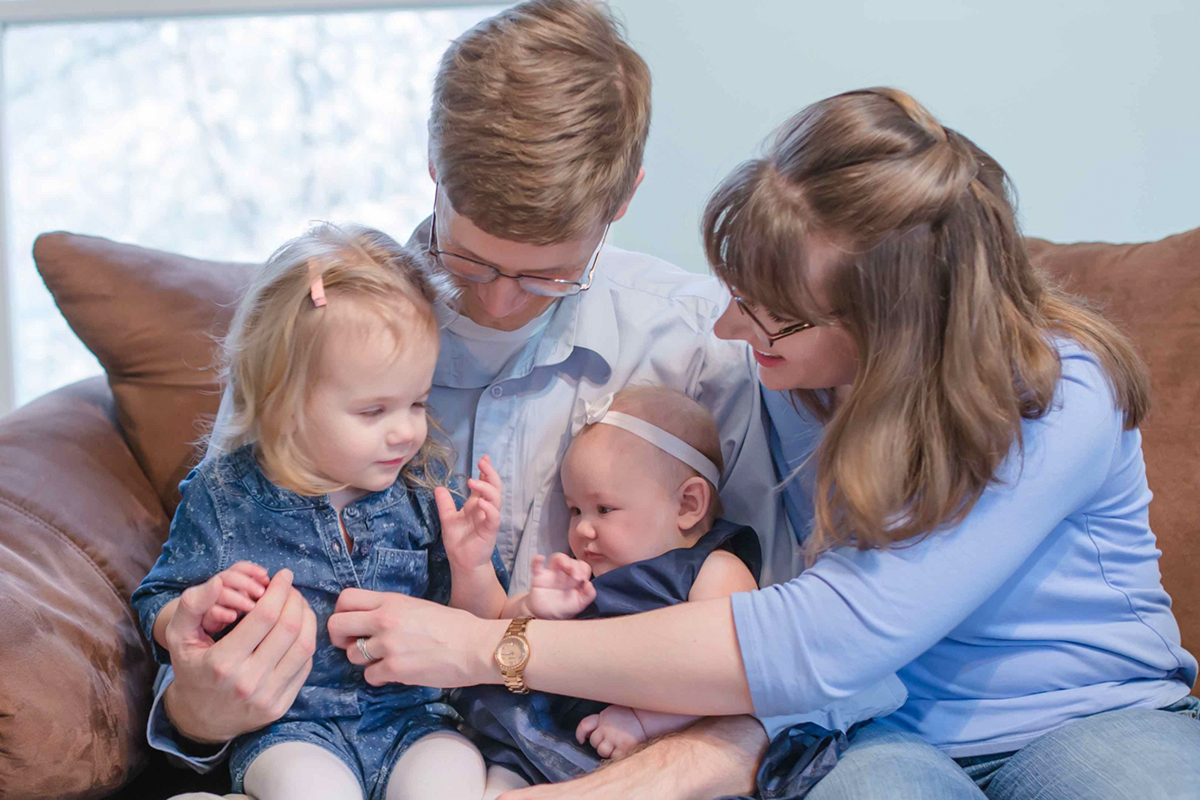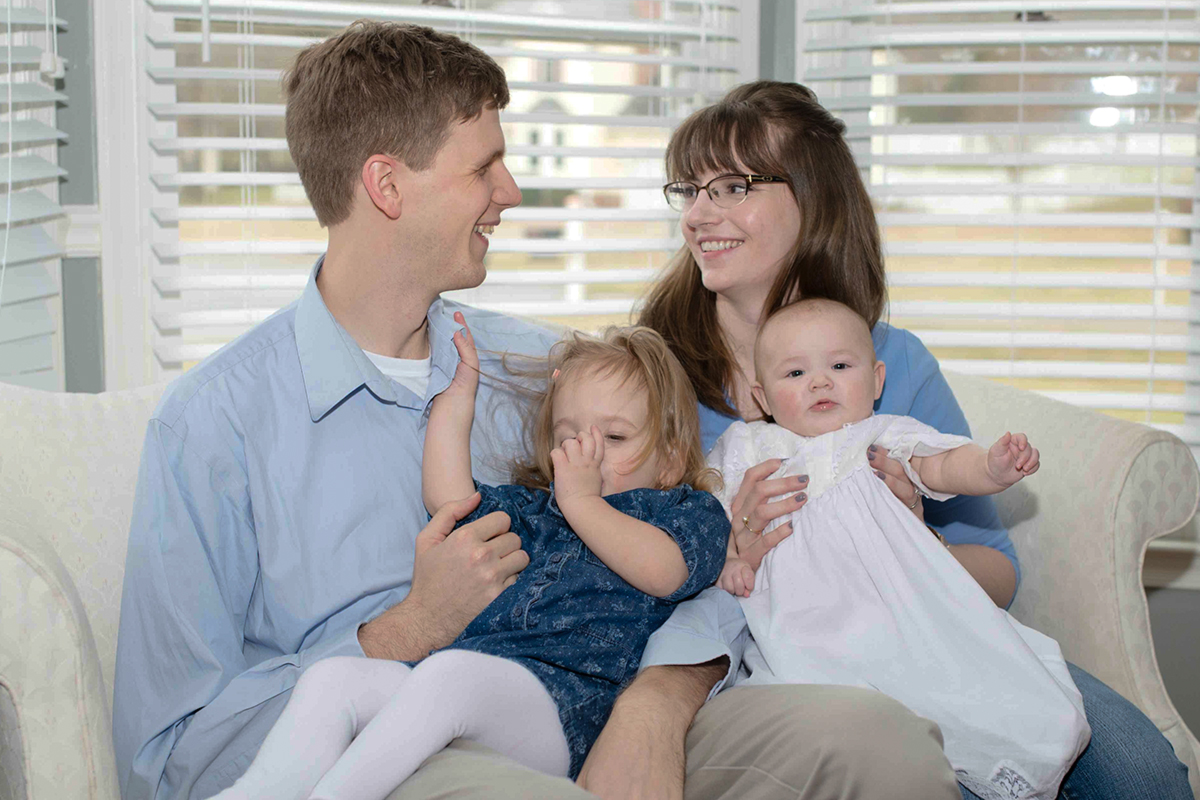When they married, Joyce and Andrew Bodoh were like many young couples — life was good and they looked forward to starting a family. After trying for a while, they conceived, but then Joyce suffered a miscarriage. When they found out she was pregnant again, they were thrilled. Not long after, Joyce was diagnosed with hyperemesis gravidarum, a condition of severe nausea and vomiting, so she had a PICC line put in, a thin tube that administered medication to help her function.
“As long as the baby is healthy, I don’t care if I suffer this,” Joyce remembers thinking to herself.
The day after the PICC line came out, the couple went to see their perinatologist (a doctor experienced in a wide range of maternal-fetal conditions), who performed an ultrasound. “Then they tell us our baby girl has a rare brain disorder and is missing a large part of her brain,” recalls Joyce. “And the doctor says, ‘As a doctor I have to tell you that you have the option of abortion; I’m not recommending it, but by law I have to tell you. And this condition is so serious you should go to another specialist.’”
So the couple drove five hours to see more doctors, where Joyce had an MRI so they could look at the baby’s brain and do more tests. Then Joyce and Andrew found themselves in a tiny, claustrophobic room.
“The doctor walked in and began speaking with us. She asked our baby’s name [Elizabeth] and then used her name while she suggested an abortion — although she never actually used the word,” explains Joyce. “She told us we had two weeks left to make a decision.”
At that point, Joyce said she felt like the room was closing in on them. “We mentioned we were Catholic and pro-life and the doctor said, ‘Well, lots of people of different faiths do this,’ and then the doctors left the room and I just fell over crying and crying, so upset.” recalls Joyce.

She and Andrew decided they would deliver their baby close to home. Since Joyce developed pre-eclampsia, Elizabeth was born five weeks early on February 14, 2015 — a Valentine’s Day present. All the NICU (neonatal intensive care) team were standing ready with their equipment when all 6 lbs, 6 oz of her arrived. She was a healthy size, could breathe on her own, and do everything the doctors said she wouldn’t be able to do. She stayed in the NICU for only three days. As a newborn she had low blood sugar and they knew she had hydrocephalus, a buildup of too much cerebrospinal fluid in the brain, but it didn’t manifest until she was a few weeks old. (The increased spinal fluid made her skull expand, so neurosurgeons put a shunt in.)
Elizabeth’s rare brain condition is called schizencephaly, a very unusual cortical malformation that results in grey matter-line clefts that can impact one or both sides of the brain, which doesn’t develop fully. It can occur during the early weeks of pregnancy. Although a large part of Elizabeth’s brain wasn’t there at birth, by six months old, everyone was amazed to see it had grown.
“It’s hard to believe that with just one MRI, doctors were making definitive statements about what would happen with Elizabeth,” says Joyce. “The doctors and therapists who work with her now aren’t like that — they’re great at what they do. No one has said she won’t be able to do certain things. She can’t talk yet, but she can communicate. She clicks her heel when listening to Elmo. She’s happy.”
Joyce says it the couple’s faith was the number one thing that kept them grounded throughout the experience. “I would regularly go to certain Bible passages, like Romans 5: 1-5 for consolation,” she says. “We had so many people praying for us — including priests, and my husband’s large family — two of his sisters are nuns and their communities were also praying.”
Joyce and Andrew also spent a lot of time researching Elizabeth’s condition, so they would know everything they could, which gave them a greater sense of control. Joyce also remembers giving herself permission to enjoy her pregnancy.

“When I was pregnant, I didn’t want a baby shower; I didn’t want to buy baby stuff that I may never get to use,” says Joyce. “But a month before Elizabeth was born, I decided I was missing out on what new moms get to experience, so I bought a banner for her room and a teddy bear and that’s when I decided I was going to enjoy the rest of my pregnancy.”
Joyce’s advice to other expectant parents who may find themselves with a troubling diagnosis for their baby and the suggestion to abort is “to remember that God is in control.”
“Never, ever, ever give up hope,” she says. “And if your hope turns into the situation where your child won’t live long, then cherish them and be grateful for the time you do have together.”
She also recommends reaching out for help. “I didn’t want to talk about it; to be reminded of what I was going through, but then I found an excellent organization in my community for women with bad pre-natal diagnoses called Embracing Grace and it was amazing,” she says. “The most helpful people are those who remind you that God is in control and who’ve had terrible experiences themselves and come out on the other side with a stronger faith — it’s really inspiring.”
The Bodoh family welcomed a second daughter, Rebecca, six months ago, and now at two years old, Elizabeth is doing well. Over years of use, shunts usually “fail” or get infected, so last week hers was replaced because it was blocked. She has very low vision, for which she receives therapy, and some developmental delays. Last year she developed epilepsy which is now being managed well by a ketogenic diet under the supervision of a nutritionist. This little girl born on Valentine’s Day, who wasn’t supposed to make it, is loved beyond words.
Joyce likes to point out that the patron saint of epilepsy is St. Valentine.
Photo credits: lead photo by Carolyn French; other photos by Casey Hollins

